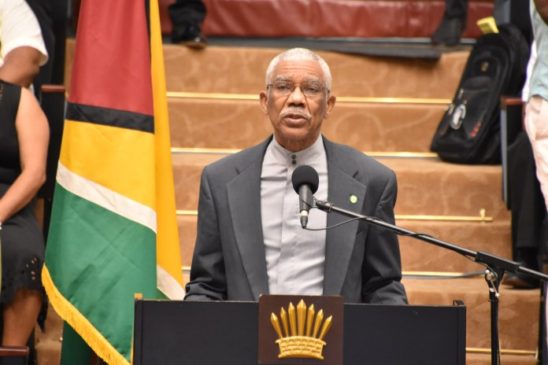President David Granger emphasised in his Independence Day message that the future belongs to the youths of Guyana. Calling Guyana’s independence transformative, the President noted that May 26, 1966, laid the foundations for a better life.
The Head of State said that the immediate post-Independence decade was a period of effective efforts aimed at expanding the country’s infrastructure and improving public services. These nation-building initiatives, he added propelled rapid improvements in the country’s economic, physical and social infrastructure.
“The newly-independent State strolled onto the global stage with confidence. It became respected and recognised for its efforts in advancing the cause of the developing countries, particularly of the small African, Caribbean and Pacific states.”

According to the President, youths today have a greater say in decision-making than before, with young professionals and entrepreneurs being consulted for the budget formulation. Pointing to the upcoming oil and gas production, President Granger noted that this new revenue is likely to bring more transformation.
“The future belongs to young people. This axiom is true today as it was 53 years ago when Guyana attained its Independence. The central aspiration of the independence generation was to secure a better future for their children and grandchildren,” the Head of State said.
He pointed out that Guyana, today, is poised for another transformative moment. The commencement of petroleum production, next year, and the transition towards becoming a “green” State will increase economic growth and provide greater resources for development.
“The future belongs to young people. The resources derived from economic expansion and diversification will be deployed, primarily, to secure and safeguard our children’s and grandchildren’s future. Young people can be assured of greater opportunities as a result of oil production and the policies of the Guyana Green State Development Strategy.”
Young people, he added have started to play a pivotal role in driving development.
“… a nation in which young people are united, educated, trained, safe, happy, healthy and integrally involved in the decision-making processes, while enjoying equality of opportunity and equal access to the resources of our country and are politically, economically and socially empowered.”
Education, equality, empowerment and employment are the four pillars of our national youth policy. The good life, regardless of the resources available to us, will be unattainable unless young people have access to better education, enjoy greater equality, are provided with expanded employment opportunities and are empowered to make decisions which determine their future.
Education is a bedrock of Government’s youth development policy, he stated, adding that Government’s policy of every child in school aims at ensuring that no one is left behind. Young people are being equipped with the knowledge and skills to become productive citizens.



